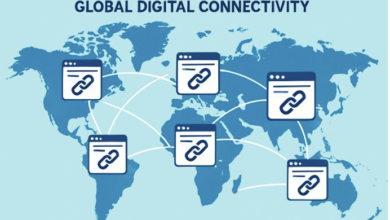
How Multi-Channel Marketing Tools Are Revolutionizing Strategies
Multi-channel marketing is not a new concept, but with the advent of digital technology, it has evolved rapidly to become a cornerstone of modern marketing strategies. Today’s businesses face the challenge of reaching consumers across multiple platforms. By leveraging cutting-edge marketing multi-channel tools, they can now create more targeted campaigns, optimize audience engagement, and enhance brand consistency. These tools are shaping the future of marketing, and understanding their impact is crucial for any business looking to thrive in a competitive landscape. Below, we explore how these tools are transforming the marketing landscape.
Exploring the Impact of Multi-Channel Marketing Tools on Modern Strategies
Employee using a laptop in a modern office, representing analysis of marketing multi-channel tools in contemporary business strategies
The proliferation of devices and online platforms has transformed how consumers interact with brands. With the emergence of sophisticated multi-channel marketing tools, businesses can now seamlessly orchestrate their messaging across various channels. This approach not only improves reach but also ensures that the brand’s narrative remains consistent, regardless of where or how a consumer encounters it.
These tools enable marketers to synchronize campaigns across email, social media, mobile, and other channels, ensuring that no opportunity for connection is missed. The ability to automate and schedule content delivery frees up time and resources, allowing teams to focus on strategic planning and creative development.
Moreover, multi-channel marketing creates a more resilient strategy. If one channel underperforms or faces new regulations, businesses can pivot effortlessly, without compromising their overall marketing efforts. It’s a dynamic solution that caters to the ever-changing digital ecosystem.
The impact is not lost on consumers either. As they become accustomed to cohesive multi-channel experiences, their expectations rise, challenging marketers to continually innovate and adopt the latest tools to meet demand. This has brought companies, such as Upland Software, with its marketing multi-channel tools, to the forefront in providing comprehensive solutions for marketers.
Enhancing Customer Experience Across Various Platforms

Female professional using a multi-channel marketing tool to enhance customer experience across multiple platforms in a modern workspace
At the core of any effective marketing strategy lies the customer experience. That experience, in a multi-channel marketing context, must be consistent and personalized across all touchpoints. Advanced marketing tools are enabling businesses to deliver this level of customization by leveraging user data to serve relevant content that resonates with each audience segment.
By analyzing user interactions across multiple channels, companies can gain a comprehensive view of customer behaviors and preferences. This insight guides the creation of campaigns that feel more like a dialogue rather than a broadcast, fostering stronger relationships between brands and consumers.
Such tools also provide the agility to adapt user experiences in real-time. If customers are engaging more on a particular platform, marketers can quickly adjust budgets and strategies to capitalize on this trend, thus enhancing the effectiveness of their campaigns.
Ultimately, the improved customer experience catalyzed by these tools leads to increased consumer loyalty and lifetime value. By meeting consumers where they are with messages that matter, brands set themselves apart in a crowded market, forming meaningful connections that drive sustainable growth.
See also: Tunnel Radio Technology Advancements for Underground Mines
Measuring Success with Advanced Analytics and Reporting Features
One of the most significant advantages of multi-channel marketing tools is their ability to measure success across different campaigns and platforms. These tools come equipped with advanced analytics and reporting features that provide insights into the performance of marketing efforts, shedding light on what works and what doesn’t.
With these metrics, marketers can track their return on investment (ROI) more accurately, allowing for strategic allocation of budgets. These comprehensive analytics also provide detailed insights into conversion funnels, customer retention rates, and engagement levels, all of which are crucial for refining the effectiveness of campaigns.
Furthermore, the reporting capabilities of these platforms enable marketers to distill complex data into understandable and actionable reports. This is crucial for communicating results to stakeholders and applying the lessons learned to future marketing initiatives. The continuous loop of analysis and improvement is a hallmark of truly data-driven marketing strategies.
By benchmarking success and identifying room for optimization, brands can tailor their strategies to meet their specific goals. This level of analysis does more than validate efforts; it is an essential aspect of growth and evolution in an organization’s marketing strategy.
Altogether, multi-channel marketing tools are transforming the way businesses engage with their audiences by enabling seamless, personalized, and data-driven campaigns. As these tools become more advanced, they are setting a new benchmark for marketing success in an increasingly digital world.




